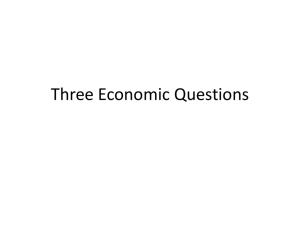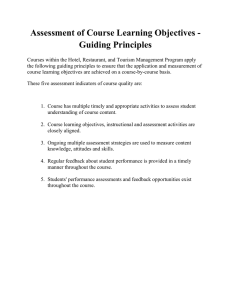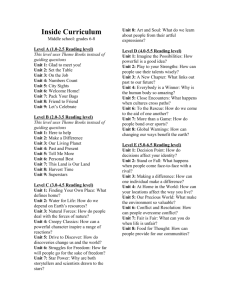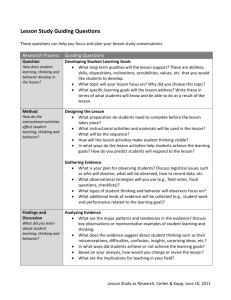Focus on Learning PowerPoint Presentation
advertisement
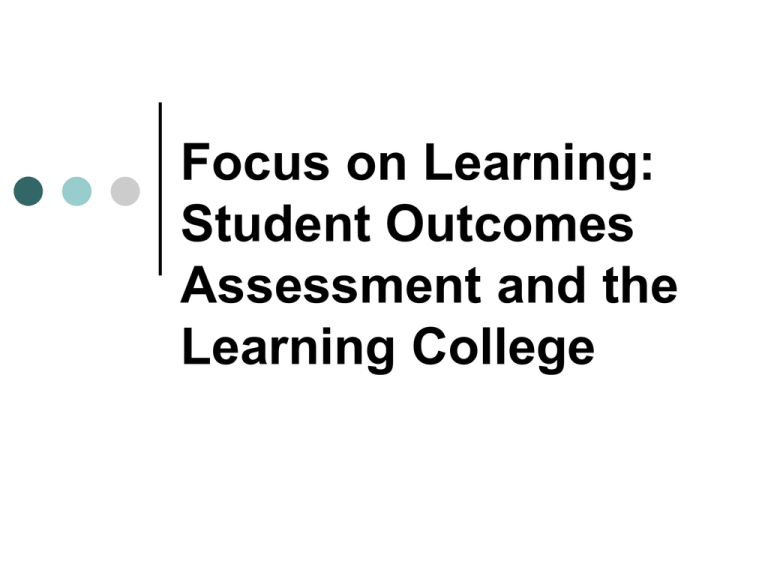
Focus on Learning: Student Outcomes Assessment and the Learning College American Association for Higher Education and The Higher Learning Commission Changing Institutional Priorities Conference Workshop Omaha, Nebraska June 2003 Original Presentation by: Gail Mee Dean of Instruction Mesa Community College 1833 West Southern Avenue Mesa, Arizona 85202 <gailmee@mail.mc.maricopa.edu> The Assessment Problem Assessment goes against the grain of academic culture. Faculty are suspect of the motivations that underlie assessment. The academic community believes that assessment lacks scientific rigor. Marchese, 2000 Why Assess Student Learning? To respond to demands for accountability from external constituents. To provide evidence of institutional effectiveness. To document successes and identify weaknesses in programs. To improve the curriculum, instruction, and student learning. Purpose of Assessment “The overriding purpose of assessment is to understand how educational programs are working and to determine whether they are contributing to student growth and development. Hence, the ultimate emphasis of assessment is on programs rather than on individual students.” Palomba & Banta, 1999 Assessment Essentials Assessment and the Learning College A new kind of college . . . “The call has gone out for building a new kind of college – A Learning College for the 21st Century that will focus the full resources of the college on student learning.” O’Banion, 1997 An Inventory for Learning – Centered Colleges O’Banion (2000) posits 14 benchmark activities to be used as guidelines for learning-centered colleges. Three of these benchmarks relate directly to assessing student learning. Learning-Centered Colleges Hold Conversations about Learning Identify and Agree on Learning Outcomes Assess and Document Learning Outcomes O’Banion, Community College Journal, Aug/Sept 2000 Elements of the learning college Belief in everyone as a learner Shared purpose, values, and leadership Respect for individualism and community Communication and connections Learning environments Evidence of learning Ten Guiding Assessment Principles for the Learning College Guiding Principles 1. Assessment is driven by college values. Student learning outcomes are aligned with college mission, vision, and values. Student learning outcomes that are valued are assessed. Guiding Principles 2. The college makes a long-term commitment. The board and administration make public statements about the importance of assessment. There are published statements about assessment in key documents. The college has committed resources to assessment. Guiding Principles 3. The Chief Academic Officer understands and believes in the value of assessment. CAO has responsibility for leadership of assessment. CAO encourages participation and provides support for faculty involvement and professional development. CAO ensures that results are used appropriately. Guiding Principles 4. Faculty lead the program and own the results. Faculty define student learning outcomes. Faculty identify or develop appropriate tools for assessment. Faculty use assessment results to make programmatic changes and improve learning. 4. Faculty lead the program and own the results, cont’d. Faculty governing body is an integral part of the assessment process. A majority of faculty are knowledgeable about assessment vocabulary and practices. Faculty pursue development opportunities related to assessment. Guiding Principles 5. Technical expertise and support are provided. Research Office plays a formal support role, or knowledgeable staff or faculty play that role. Roles of faculty and technical support staff are clearly defined. Guiding Principles 6. Learning outcomes are clearly defined at the program level. The difference between “course” and “program” assessment is clear. The college has clearly identified “programs”. Student learning is assessed at the completion of a program. Program Level Outcomes Program level outcomes are not just an accumulation of course objectives. Rather, they reflect a synthesis, or a holistic picture, or what is expected of students completing a defined program or course of study. Defining Student Learning Outcomes Faculty collaborate and determine specific student outcomes for a given program of study. The outcomes describe what students will be able to do at the completion of the program. MCC Sample Gen Ed Outcome: Written Communication Write a clear, well-organized paper using documentation when appropriate. Guiding Principles 7. Measurement tools align directly with learning outcomes. Outcomes are clearly defined before measures are developed. Selected measures match the defined outcomes. Measurement Tools Faculty select or develop measures specifically aligned with well-defined student learning outcomes. The measure may be facultydeveloped or externally-developed standardized measures. Measures should be pilot-tested. MCC Measurement Tool: Written Communication Students are given a writing prompt for which they must develop and argue for their position on the given topic. Students write a multi-paragraph essay. The essays are blind scored by faculty using a faculty-developed scoring rubric. Guiding Principles 8. Sound research design and methodology are used. There is a systematic plan for gathering, analyzing, reporting, and disseminating the results. a) What is assessed? b) Who is assessed? c) How are the assessments administered? d) Where and when are they administered? Guiding Principles 9. Results are used by faculty to improve learning. A process is in place for sharing results with faculty. Faculty are making changes to curriculum and instruction based upon assessment results. Guiding Principles 10. Assessment is linked to college planning. Results are used to develop department plans. Results of assessment inform college planning and budgeting decisions. Linking Assessment and Planning Using assessment results to improve student learning is a stated goal in the College Strategic Plan. Faculty and departments develop systems for reviewing results to improve curriculum, instruction, and student learning. The college-wide planning process provides a structure to complete the feedback loop. Sustaining Assessment for the Long Term Create an expectation for assessment among students. Disseminate the results of assessment. Catalog, schedule, student handbook, student newspaper, web sites Annual assessment reports, faculty publications, newsletters, web sites Constantly evaluate the outcomes, measures, procedures, and results. Sustaining Assessment Cont’d. Link assessment results to planning and budgeting processes. Engage faculty in decision-making during every stage of the process. Allow the program to evolve and mature. Assessment and the Learning College Student outcomes assessment places learning at the center of the academic program and the student experience. Assessment is a necessary component of the learning college A Continuous Cycle Focused on Learning
